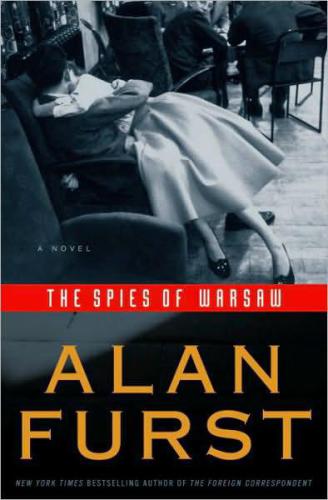
The Spies of Warsaw
Night Soldiers Series, Book 10
کتاب های مرتبط
- اطلاعات
- نقد و بررسی
- دیدگاه کاربران
نقد و بررسی

Starred review from April 14, 2008
Furst (The Foreign Correspondent
) solidifies his status as a master of historical spy fiction with this compelling thriller set in 1937 Poland. Col. Jean-François Mercier, a military attaché at the French embassy in Warsaw who runs a network of spies, plays a deadly game of cat-and-mouse with his German adversaries. When one of Mercier’s main agents, Edvard Uhl, an engineer at a large Düsseldorf arms manufacturer who’s been a valuable source on the Nazis’ new weapons, becomes concerned that the Gestapo is on to him, Mercier initially dismisses Uhl’s fears. Mercier soon realizes that the risk to his spy is genuine, and he’s forced to scramble to save Uhl’s life. The colonel himself later takes to the field when he hears reports that the German army is conducting maneuvers in forested terrain. Even readers familiar with the Germans’ attack through the Ardennes in 1940 will find the plot suspenseful. As ever, Furst excels at creating plausible characters and in conveying the mostly tedious routines of real espionage. Author tour.

Starred review from April 1, 2008
Furst's latest novel is sure to be counted as one of the very best of the historical espionage genre. Literate, admirably plotted, and featuring a memorable protagonist, it is realistic and sad but hopeful and romantic. A highly competent French army officer, Jean-François Mercier is assigned in 1937 to military attaché duty in Warsaw, a position recognized by all as an opportunity, if not a duty, to engage in spying. Mercier is a World War I combat-wounded hero, a widower whose behavior reveals a nobility and a sense of honor mostly lacking in today's fiction heroes. Using Polish and German agents, he engages in thrilling derring-do and soon recognizes the sinister intentions of the Nazis, which the French high command apparently chooses to ignore. He does his best to alert the French General Staff, especially as to German invasion strategy. Furst brilliantly captures the setting, along with the cynicism of the Warsaw sociopolitical scene. His presentation of Mercier's romantic interludes with a Parisian woman of Polish heritage is sophisticated, elegant, and discreet. Enthusiastically recommended for all libraries. [See Prepub Alert, "LJ" 2/1/08.]Jonathan Pearce, California State Univ., Stanislaus
Copyright 2008 Library Journal, LLC Used with permission.

Starred review from March 15, 2008
Its the autumn of 1937, and the shadows of war are darkening over Warsaw. Colonel Jean-Francois Mercier, military attach' with the French embassy (a spy, that is), doesnt like what hes hearing, wherever he snoops. The Poles know trouble is coming but arent prepared for it, and the French, who might still be able to prepare, are convinced they are impregnable. As spies from throughout Europe gather at sundry diplomatic functions to trade innuendos, Mercier stumbles across what could be the real thing: access to a renegade Nazi who might be able to broker a deal that could give the French knowledge of German attack plans. This is Fursts wheelhouse, of course, Europe sliding toward war, intelligence flowing as freely as wine in every caf', romance (a shadow sport, like espionage) flourishing as tanks gather at the border.Furst uses essentially the same setting (Warsaw stands in for Paris this time) andestablishes the same moodin most of his novels, but he always gives us something new, some heretofore unrevealed angle of vision. This time its a behind-the-scenes look at French spies trying to convince French politicians to open their eyes. Thats the big picture, but as always, its the human side of the drama that draws us: Mercier, the career soldier, falling in love at the wrong time with a Polish lawyer and attempting to carve out an individual life in the midst of international chaos. Nobody does this stuff better than Furst because nobody can dramatize like he can thehorrible realization that somebody elses politics will soon obliterate daily life as you know it.(Reprinted with permission of Booklist, copyright 2008, American Library Association.)

























دیدگاه کاربران